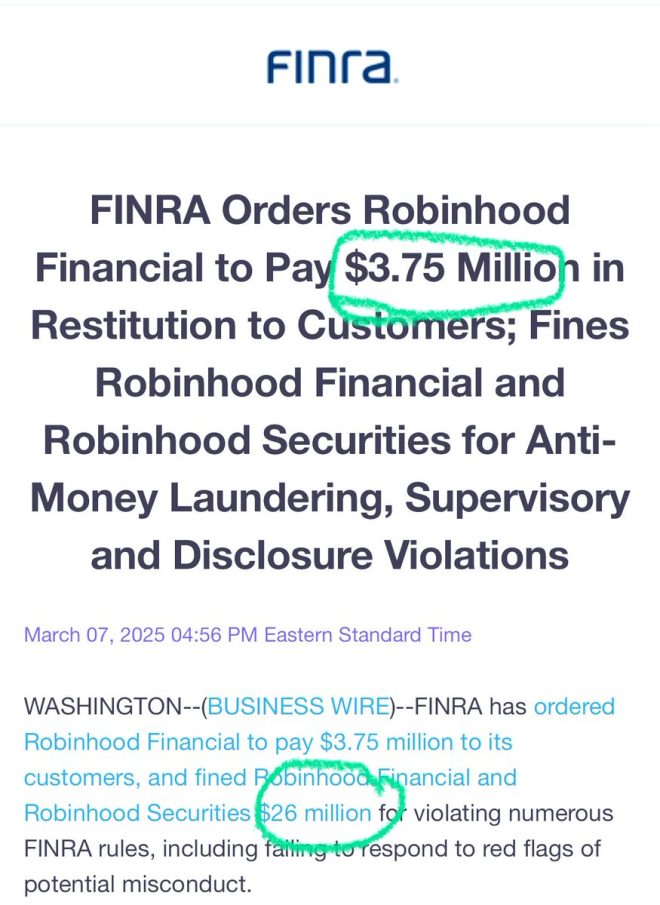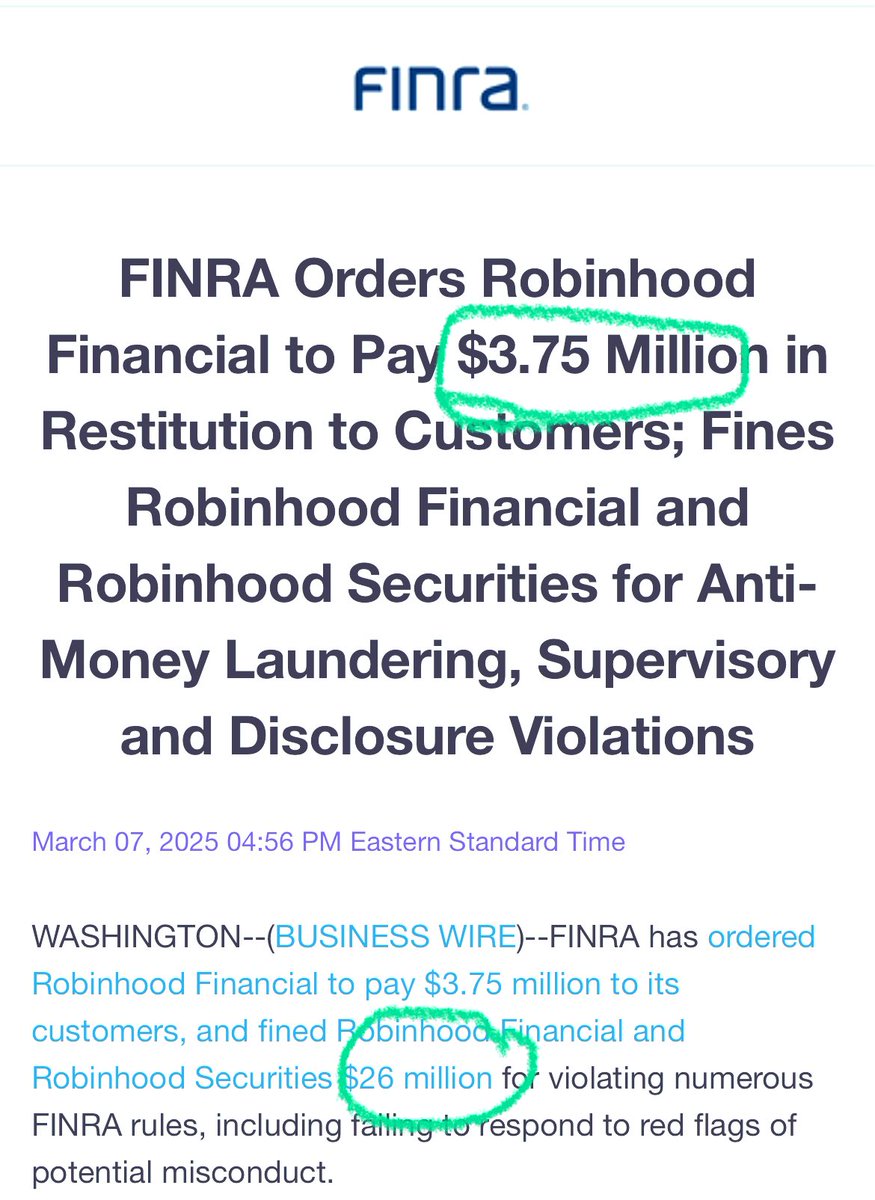
Robinhood Faces $29.75 Million Fine for Clearing Technology Oversight
In a recent update, Robinhood, the popular trading platform, has been fined $29.75 million for its failure to adequately supervise its clearing technology system, particularly during a critical period in January 2021. This penalty has raised significant concerns among investors and regulators alike, especially considering the events surrounding the GameStop ($GME) trading frenzy that occurred at that time.
Background on Robinhood and the $GME Incident
Robinhood gained widespread attention in January 2021 when it restricted trading on GameStop, a stock that had become the focal point of a massive short squeeze driven by retail investors. The platform’s decision to halt buying of $GME shares led to a significant backlash from the retail trading community, with many accusing Robinhood of betraying its users for the benefit of institutional investors.
The fine of $29.75 million comes as a result of the Financial Industry Regulatory Authority (FINRA) finding that Robinhood did not have sufficient oversight over its clearing technology systems. These systems are crucial for processing trades and ensuring that transactions are executed smoothly and efficiently. The lack of proper supervision during a volatile trading period has been deemed a serious lapse in judgment by regulators.
Implications of the Fine
The penalty, while substantial, has been described by many as a "measly slap on the wrist" given the scale of the issues at hand. Critics argue that the fine does not adequately reflect the impact of Robinhood’s actions on retail investors, many of whom suffered significant financial losses as a result of the trading restrictions.
- YOU MAY ALSO LIKE TO WATCH THIS TRENDING STORY ON YOUTUBE. Waverly Hills Hospital's Horror Story: The Most Haunted Room 502
The situation highlights the ongoing scrutiny that Robinhood has faced since the $GME incident, including multiple lawsuits and investigations. The $29.75 million fine is just one of several regulatory challenges that the company has encountered as it navigates the complex landscape of financial regulations.
The Broader Impact on Retail Trading
Robinhood’s actions and the subsequent regulatory response have sparked a broader conversation about the responsibilities of trading platforms and their duty to protect retail investors. As more individuals turn to online trading, the need for robust systems that can handle sudden spikes in trading volume becomes increasingly important.
The events of January 2021 have led to calls for greater regulation of trading platforms to ensure that they are equipped to handle volatility and protect investors from the risks associated with trading. Many advocates argue that platforms like Robinhood should prioritize the interests of retail investors over those of institutional players.
Conclusion
The $29.75 million fine imposed on Robinhood serves as a reminder of the challenges faced by trading platforms in a rapidly evolving market. As retail trading continues to grow in popularity, the need for effective oversight and robust technological infrastructure becomes paramount. The ongoing scrutiny of Robinhood’s actions during the $GME incident will likely influence regulatory approaches to online trading in the future.
In summary, while the recent fine may appear insignificant in the grand scheme of Robinhood’s operations, it encapsulates a larger narrative about accountability, investor protection, and the evolving landscape of retail trading. As regulators continue to keep a close eye on trading practices, the implications for Robinhood and similar platforms could be profound, shaping the future of retail trading for years to come.

JUST IN: Robinhood $HOOD gets a measly slap on the wrist of $29.75M for “failing to reasonably supervise its clearing technology system in January 2021.”
Of course this is in reference to $GME when they shut the buy button off totally burning retail.
They’ve also been fined for… pic.twitter.com/5tl1TCOmAl
— Reese Politics (@ReesePolitics) March 8, 2025
JUST IN: Robinhood Hit with $29.75M Fine
Robinhood, the popular trading platform known for its commission-free trades, has recently come under fire again. The company was slapped with a fine of $29.75 million for “failing to reasonably supervise its clearing technology system” back in January 2021. This penalty has raised eyebrows among retail investors and industry experts alike, especially considering the ongoing saga surrounding the infamous GameStop ($GME) trading frenzy.
This fine seems like a mere slap on the wrist for a company that played a pivotal role in one of the most talked-about trading events in recent history. Many are questioning whether this punishment is enough to hold Robinhood accountable for its actions during that tumultuous period.
What Happened in January 2021?
To truly understand the implications of this fine, we have to rewind to January 2021. It was a time when the stock market was buzzing, primarily due to the short squeeze on GameStop. As retail investors rallied to buy shares of $GME, Robinhood suddenly restricted trading on the stock, effectively shutting off the buy button. This decision left countless retail investors feeling burned and frustrated.
The company claimed the decision was driven by liquidity issues and the need to meet capital requirements. However, many investors saw it as an unfair tactic to protect institutional investors at the expense of retail traders. This event sparked outrage and led to congressional hearings, highlighting the growing disparity between retail and institutional trading.
Understanding the Fine
So, what does this $29.75 million fine really mean? Well, it stems from Robinhood’s failure to adequately supervise its clearing technology system. The system is crucial for processing trades efficiently and ensuring that all transactions are executed smoothly. When this system falters, it can lead to significant issues for traders, as was seen during the $GME incident.
The fine is meant to address the lapses in oversight that led to the chaotic trading environment during that month. However, many critics argue that a fine of less than $30 million is simply not enough for a company that has faced such serious allegations. Some feel it trivializes the experiences of retail investors who were left in the lurch while Robinhood’s systems failed.
The Impact on Retail Investors
The repercussions of Robinhood’s actions have been profound. Retail investors, many of whom were new to trading, felt betrayed when they were unable to buy shares of $GME. Instead, they found themselves on the sidelines while institutional investors continued to profit. The situation highlighted the vulnerabilities of retail traders in an increasingly complex market.
For many, this incident was more than just a financial setback; it was a wake-up call. Retail investors began to question the reliability and ethics of platforms like Robinhood. They started seeking alternatives that would prioritize their interests over institutional ones. This shift has led to a growing demand for transparency and better regulation in the trading space.
Robinhood’s Response
In response to the fine and the backlash from retail investors, Robinhood has emphasized its commitment to improving its systems and ensuring better oversight in the future. The company has made various changes to its operational structure, including hiring new personnel and investing in technology upgrades.
However, some remain skeptical about whether these changes will be enough to restore trust among its user base. After all, the damage has been done, and many investors now view Robinhood with a critical eye. The question remains: can Robinhood truly recover from this incident, or will it continue to struggle with its reputation in the long run?
Regulatory Scrutiny and Future Implications
The fine is just one aspect of the broader regulatory scrutiny that Robinhood faces. In the wake of the $GME debacle, regulators have become increasingly vigilant about trading practices and the protections afforded to retail investors. This heightened scrutiny could lead to more stringent regulations for trading platforms in general, particularly those that cater to retail investors.
The industry is at a turning point, and Robinhood is at the forefront of this change. As regulators look to implement new rules, the way trading platforms operate may undergo significant transformations. It’s essential for these platforms to prioritize transparency and consumer protection to avoid further backlash from the trading community.
Lessons Learned from the Robinhood Saga
The Robinhood saga serves as a critical lesson for both retail investors and trading platforms. For investors, it underscores the importance of understanding the platforms they use and the risks involved in trading. No platform is immune to failures, and being aware of these vulnerabilities can help investors make informed decisions.
For trading platforms, the incident is a reminder of the need for robust systems and oversight. Investors trust these platforms with their money and expect them to operate fairly and transparently. Failing to do so can lead to severe reputational damage and loss of trust from users.
The Future of Trading Platforms
As we look ahead, the future of trading platforms like Robinhood is uncertain. With the ongoing scrutiny and potential regulatory changes, these platforms will need to evolve quickly to meet the demands of an increasingly savvy investor base.
For Robinhood, the road to redemption will require more than just implementing new technologies. It will need to cultivate a culture of transparency and accountability, demonstrating to its users that it prioritizes their interests. This shift could be pivotal in rebuilding trust and ensuring a loyal user base moving forward.
Investors will undoubtedly be watching closely as Robinhood attempts to navigate this challenging landscape. Will it emerge stronger from this experience, or will it continue to face hurdles that impede its growth? Only time will tell.
In Closing: The Evolving Landscape of Retail Trading
The recent fine against Robinhood is a significant moment in the ongoing evolution of retail trading. As the industry grapples with the fallout from the $GME incident, it’s clear that lessons are being learned on both sides. Retail investors are becoming more informed and cautious, while trading platforms are recognizing the need for better oversight and customer service.
This evolving landscape presents both challenges and opportunities. For Robinhood, it’s a chance to redefine its brand and establish itself as a leader in responsible trading. For retail investors, it’s an opportunity to engage more thoughtfully with the platforms they choose to use, ensuring they are empowered in their trading journeys.
The next few years will be crucial in shaping the future of retail trading, and all eyes will be on Robinhood as it navigates this complex terrain. Will it rise to the occasion, or will it falter under pressure? The answers are unfolding, and the trading community is eager to see how this story develops.
